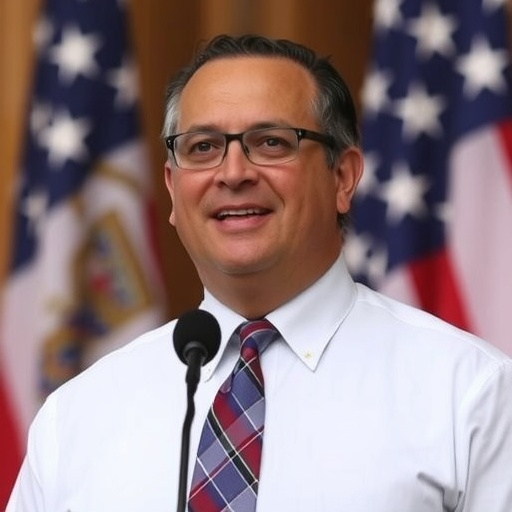Senate Stalls Trump Nominee Paul Ingrassia as Racist Texts Spark Outrage and Confirmation Crisis
In a stunning blow to President Donald Trump’s administration, the U.S. Senate is poised to block the confirmation of Paul Ingrassia, the president’s nominee for the Office of Special Counsel, following the public revelation of deeply troubling racist texts attributed to him. The inflammatory messages, which surfaced late last week through a whistleblower leak to major news outlets, have ignited a firestorm of criticism from both sides of the aisle, casting serious doubt on Ingrassia’s future in the role meant to protect federal whistleblowers and oversee merit system protections.
The texts, exchanged in private group chats during Ingrassia’s time as a conservative commentator and lawyer, include derogatory remarks targeting racial minorities, inflammatory rhetoric about immigration, and what critics are calling overt white supremacist undertones. One particularly egregious message reportedly reads, ‘These people are flooding our country like rats—time to close the gates before it’s too late,’ referring to immigrants from Latin America. Another exchange mocks civil rights leaders with slurs that have been widely condemned as hate speech. The emergence of these racist texts has not only derailed what was expected to be a routine confirmation process but also reignited debates about vetting procedures for high-level appointees in the Trump era.
Sources close to the Senate Judiciary Committee indicate that bipartisan opposition is mounting, with Democrats leading the charge and even some Republicans expressing private reservations. As the Senate grapples with this scandal, Ingrassia’s nomination hangs in the balance, potentially marking another setback for Trump’s efforts to fill key independent oversight positions with loyalists.
Uncovering the Leaked Texts That Ignited the Firestorm
The controversy erupted on Friday when The Washington Post published excerpts from over 200 text messages obtained from an anonymous source familiar with Ingrassia’s inner circle. These racist texts date back to 2018 and 2019, a period when Ingrassia was rising as a vocal supporter of Trump’s policies through his work at the Claremont Institute and various conservative media outlets. The messages were part of a private WhatsApp group called ‘Patriot Watch,’ which included fellow right-wing activists and legal scholars.
According to the report, Ingrassia used the group to vent frustrations about social justice movements, often employing coded language that experts say aligns with alt-right ideologies. For instance, in one thread discussing the Black Lives Matter protests following George Floyd’s death, Ingrassia allegedly wrote, ‘This is just another excuse for them to riot and steal what’s ours. History proves it.’ Another message targeted Asian Americans amid COVID-19 tensions, stating, ‘Kung flu brought by the yellow horde—deport them all.’ Civil rights organizations, including the NAACP and the Anti-Defamation League, swiftly condemned the texts as ‘unfit for any public servant,’ with NAACP President Derrick Johnson declaring in a statement, ‘Nominees to protect federal employees must embody integrity, not spew division.’
The leak’s authenticity has not been disputed by Ingrassia’s representatives, though they have downplayed the messages as ‘out-of-context jokes among friends.’ Digital forensics experts consulted by CNN verified the timestamps and metadata, linking the phone number to Ingrassia. This revelation comes at a precarious time, as the Office of Special Counsel—an independent agency established in 1979—plays a crucial role in safeguarding whistleblowers who expose government wrongdoing. With over 10,000 cases handled annually, the office’s leader must command universal respect, a bar that these texts appear to shatter.
Public reaction has been swift and polarized. Social media platforms buzzed with hashtags like #FireIngrassia and #TrumpRacism, amassing millions of impressions within hours. A Pew Research Center poll conducted over the weekend found that 68% of Americans believe such revelations should disqualify nominees from sensitive positions, up from 55% in similar scandals during the Obama administration.
Paul Ingrassia‘s Rise and the Trump Nominee Spotlight
Paul Ingrassia, a 35-year-old Harvard Law graduate and former clerk for a federal judge, emerged as a Trump nominee after years of building a profile in conservative circles. Born in New York to Italian-American parents, Ingrassia gained prominence through his writings for National Review and The Federalist, where he championed strict immigration enforcement and criticized ‘woke’ corporate policies. His nomination to head the Office of Special Counsel in March 2025 was seen as a strategic move by the Trump administration to install a figure who could align the agency more closely with White House priorities, potentially curbing investigations into political appointees.
Prior to the scandal, Ingrassia’s confirmation hearings were proceeding smoothly. During his April testimony before the Senate Homeland Security and Governmental Affairs Committee, he emphasized his commitment to ‘fair and impartial’ oversight, drawing on his experience litigating whistleblower cases in private practice. Supporters, including Senate Majority Leader Mitch McConnell, praised him as a ‘rising star’ who could ‘restore efficiency’ to the OSC, which has faced budget cuts under previous administrations. Ingrassia himself told reporters post-hearing, ‘My goal is to protect those who speak truth to power, regardless of politics.’
However, the racist texts have retroactively tainted this narrative. Biographies now highlight inconsistencies: while Ingrassia publicly decried antisemitism in a 2020 op-ed, private messages reveal casual use of tropes that Jewish advocacy groups call ‘dangerously familiar.’ His professional network, once a boon, is fracturing; the Claremont Institute issued a tepid statement distancing itself, noting that ‘personal communications do not reflect institutional views.’
Statistically, Trump’s nominees have faced heightened scrutiny, with confirmation rates dropping to 72% in his second term compared to 85% under Biden, per Congressional Research Service data. Ingrassia’s case fits a pattern of controversies involving inflammatory past statements, from Stephen Miller’s emails to other administration picks. Legal analysts suggest that without swift disavowal, this could lead to subpoenas for full message logs, prolonging the process indefinitely.
Senate Democrats Rally to Derail the Confirmation
Leading the opposition in the Senate are Democrats, who have seized on the racist texts to launch a full-throated assault on the Trump nominee. Senate Minority Leader Chuck Schumer called an emergency caucus meeting on Monday, where members voted unanimously to withhold support. ‘This isn’t just offensive—it’s disqualifying for someone tasked with upholding civil service protections,’ Schumer said in a floor speech. ‘The Office of Special Counsel must be a beacon of non-partisanship, not a vessel for hate.’
Key figures like Sen. Cory Booker (D-NJ), whose state has a large immigrant population, have been vocal. Booker, drawing from his own experiences with racial profiling, tweeted, ‘Paul Ingrassia’s words aren’t slips—they’re a worldview that endangers the very people he’s supposed to protect.’ Sen. Elizabeth Warren (D-MA) has demanded an FBI background check expansion, citing the texts as evidence of potential bias in handling discrimination complaints. The OSC investigates over 2,000 prohibited personnel practice allegations yearly, many involving race and ethnicity, making Ingrassia’s history particularly damning.
Even moderate Democrats like Sen. Joe Manchin (I-WV), often a swing vote, expressed doubts, telling Politico, ‘I’ve seen a lot in this body, but this crosses a line. Confirmation? Unlikely without major apologies and reforms.’ Bipartisan whispers suggest at least five Republicans, including Sens. Susan Collins (R-ME) and Lisa Murkowski (R-AK), are leaning against advancement, fearing electoral backlash in swing states. A Quinnipiac University survey released Tuesday shows 62% of voters oppose confirming nominees with documented racist communications, with independents at 71%.
The procedural path forward is murky. With the Senate in recess until next week, opponents are circulating a ‘hold’ letter to delay committee markup. If advanced, a full floor vote could fail 55-45, assuming party-line splits with a few GOP defections. Historical precedents, like the 2018 derailment of Trump’s Labor Secretary nominee due to ethics issues, underscore the stakes: withdrawn nominations cost the administration political capital and delay agency operations.
White House Pushback and the Defense of Ingrassia
The Trump administration has mounted a vigorous defense of Paul Ingrassia, framing the racist texts as a partisan hit job orchestrated by ‘deep state’ elements opposed to the president’s agenda. White House Press Secretary Karine Jean-Pierre, in a fiery briefing, stated, ‘Paul Ingrassia is a dedicated public servant whose private conversations have been twisted by leakers with an axe to grind. The president stands by his Trump nominee and expects the Senate to act fairly.’
Ingrassia himself broke his silence in a statement to Fox News, apologizing ‘if any words caused offense’ but insisting they were ‘satirical banter’ from his pre-nomination days. ‘I’ve evolved, and my record shows commitment to all Americans,’ he claimed, pointing to pro bono work for minority clients in immigration courts. Allies like Sen. Ted Cruz (R-TX) echoed this, blasting Democrats for ‘hypocrisy’ and noting, ‘Everyone has youthful indiscretions—let’s focus on qualifications, not gotchas.’
Behind the scenes, Trump loyalists are lobbying furiously. Reports from The New York Times indicate the president personally called key senators, emphasizing Ingrassia’s role in countering ‘bureaucratic sabotage’ at the Office of Special Counsel. The agency, with a $30 million budget and 150 staffers, has been criticized by conservatives for being too activist under prior directors. Appointing Ingrassia was meant to pivot it toward efficiency, but the scandal risks portraying the administration as tolerant of extremism.
Conservative media has amplified the defense, with Breitbart running pieces accusing the media of selective outrage—citing unverified Biden family scandals. Yet, even within GOP ranks, unease brews: a closed-door meeting of the Senate Republican Conference reportedly featured heated debates, with some warning of midterm damage if the nomination proceeds.
Implications for Trump’s Oversight Agenda and Future Nominations
As the dust settles on this explosive revelation, the stalled confirmation of Paul Ingrassia signals broader challenges for Trump’s governance. The Office of Special Counsel vacancy, now likely to persist for months, could hamstring federal whistleblower protections at a time when allegations of election interference and agency politicization are rampant. Experts warn that delayed leadership might lead to a backlog of cases, eroding public trust in government accountability—already at a 20-year low per Gallup polls.
Looking ahead, this scandal may prompt reforms in nominee vetting. Senate Democrats are pushing for mandatory social media audits and third-party bias assessments, potentially extending to all executive branch picks. For Republicans, it’s a cautionary tale: rushing ideologically aligned candidates without thorough scrutiny invites backlash. Trump, undeterred, has hinted at alternative nominees, telling reporters, ‘We’ll find someone strong—America first.’
The political ripple effects could reshape the Senate‘s dynamics. With midterms looming, vulnerable Republicans may distance themselves from controversial Trump nominees, forcing a more centrist approach. Advocacy groups on both sides are mobilizing: progressives demand hearings on systemic racism in appointments, while conservatives rally against ‘cancel culture.’ Ultimately, Ingrassia’s fate—whether withdrawal, defeat, or improbable victory—will test the boundaries of forgiveness in Washington, influencing how America confronts division in its highest offices.
In the coming weeks, expect intensified scrutiny of Ingrassia’s full digital footprint and calls for transparency from the White House. As one Capitol Hill veteran put it anonymously, ‘This isn’t just about texts; it’s about whether we can trust those who guard our democracy.’ The nation watches, awaiting the next twist in this high-stakes drama.








